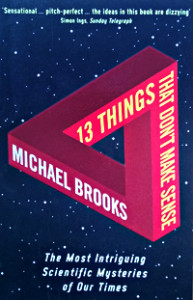13 Things That Don’t Make Sense
The most intriguing scientific mysteries of our time
by Michael Brooks. Published by Profile Books www.profilebooks.com
“There are times when we resemble nothing so much as a herd of antelope, heads down in tight formation, thundering with firm determination in one direction across the plain. At a given signal from the leader, we whirl about, and, with equally firm determination, thunder off in quite a different direction, still in tight formation.”
Though referring to astronomers, Donald Fernie’s 1969 quote could arguably apply to pretty much any area of science and here Michael Brooks (quantum physicist and consultant to New Scientist) leads us across 13 of the less well-trampled prairies of science.
More than one book has been written about the each of the subjects covered here but in ’13 Things” we get a whirlwind tour of not only the science but also how it has been filtered and distorted through the strengths and failings of experimenters and the prejudices of an all-too-human scientific Establishment.
We start with the most prominent of the mysteries currently facing science – the Universe’s ‘missing mass’. The story reads like a tragic farce with evidence being discovered – and ignored – at least three times through the 20th Century. The next chapters touch on the mystery of what is driving the Pioneer space probes off-course and the how, why (and indeed, ‘if’) of varying universal constants such as the speed of light.
Brooks succinctly covers the scandal of ‘Cold Fusion’ that ruined the careers of Pons and Fleischmann (and several researchers since), despite the main evidence presented to Congress by MIT against their claims being deeply flawed. Eugene Mallove, MIT’s chief science writer, resigned in protest and Ronald Parker of MIT’s Fusion Lab called their own data ‘worthless’.
From the more physical sciences we head into murkier – or at least less well defined – subjects such as sex, death, and aliens. Even life itself seems to evade any definitive description; obvious features dissolving like a pointillist painting the closer the examination.
Finally we come to the least ‘sciency’ of the subjects’ -Homeopathy. I’m no fan of the ‘crystal healing’ parasites who live off the desperation of the sick so I thought there was little mystery here save the gullibility of desperate people but the end of the chapter left even me with a nagging feeling that – shorn of its blatant quackery and new age mysticism – there might be some elements worth investigating.
Possibly because he has no particular patch to defend, Brooks comes across as open minded and even handed as he weaves a fascinating and very human story behind fields which are still in ferment or so distanced from objective inquiry that what data exists is often disputed and contradictory.
If you want your science to provide easy answers, this is not the book for you. Often there aren’t even easy questions.
Fascinating as these tales are, the overall message I took away from ’13 Things” is how appallingly parochial ‘real’, as-it-is-actually-practiced, science is. Time and again the lofty principal of impartial scientific observation crashes futilely against the rocks of groupthink, received wisdom and the vested interests of entrenched seniority. Who knows what breakthroughs lie currently forgotten in desk drawers or obscure publications because they do not fit the fashion or needs of current paradigms?
